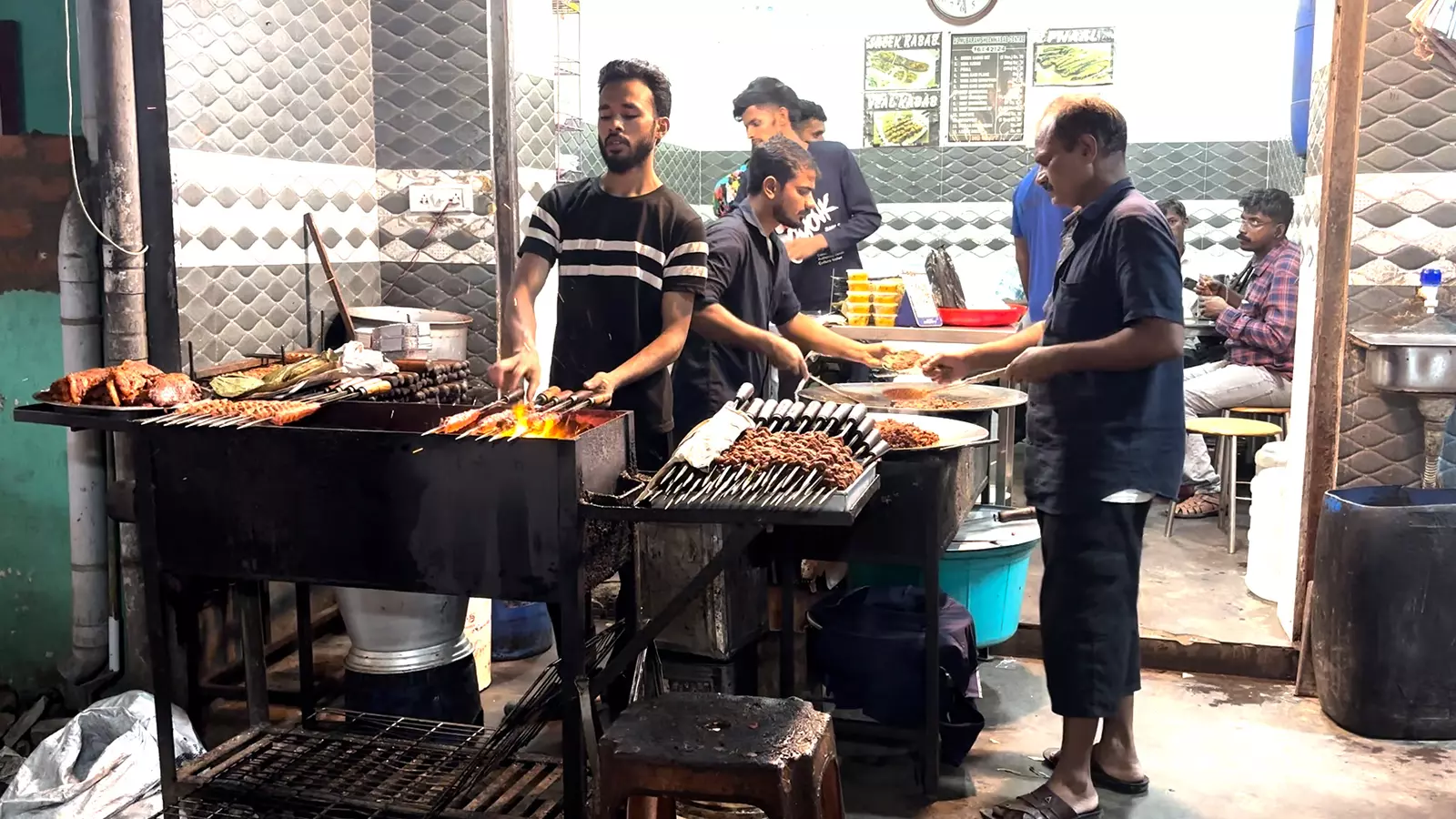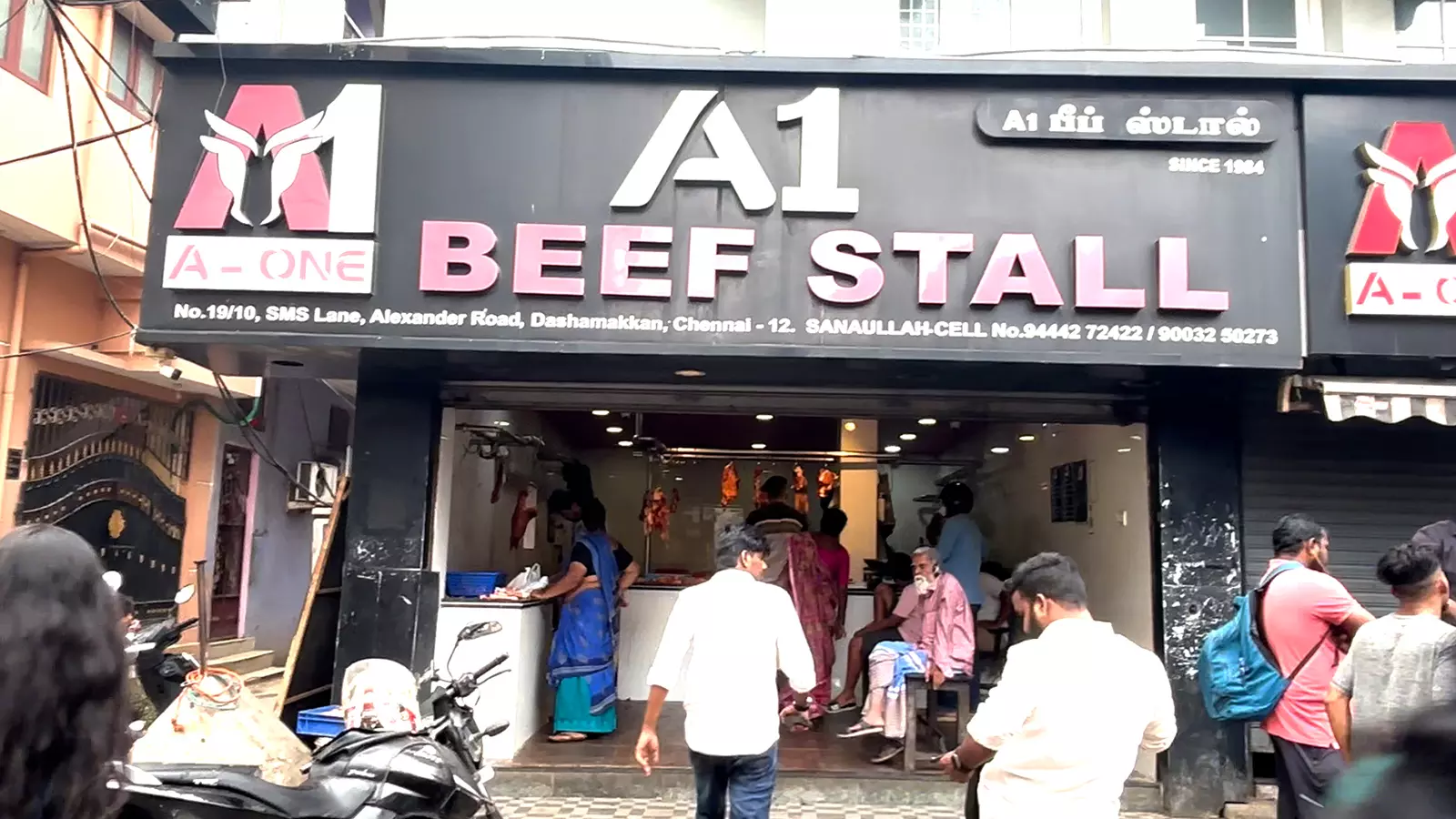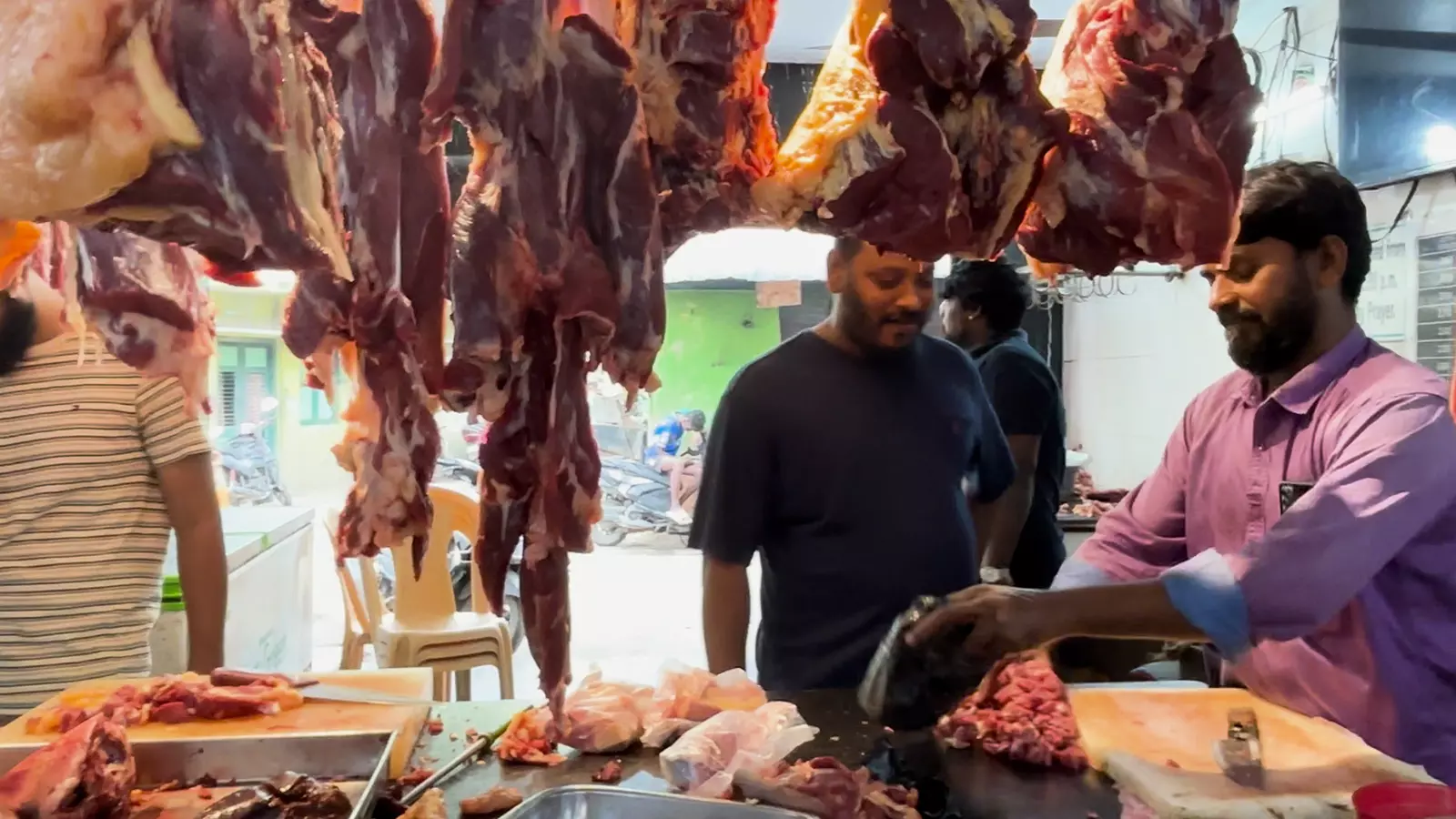
- Home
- India
- World
- Premium
- THE FEDERAL SPECIAL
- Analysis
- States
- Perspective
- Videos
- Sports
- Education
- Entertainment
- Elections
- Features
- Health
- Business
- Series
- In memoriam: Sheikh Mujibur Rahman
- Bishnoi's Men
- NEET TANGLE
- Economy Series
- Earth Day
- Kashmir’s Frozen Turbulence
- India@75
- The legend of Ramjanmabhoomi
- Liberalisation@30
- How to tame a dragon
- Celebrating biodiversity
- Farm Matters
- 50 days of solitude
- Bringing Migrants Home
- Budget 2020
- Jharkhand Votes
- The Federal Investigates
- The Federal Impact
- Vanishing Sand
- Gandhi @ 150
- Andhra Today
- Field report
- Operation Gulmarg
- Pandemic @1 Mn in India
- The Federal Year-End
- The Zero Year
- Science
- Brand studio
- Newsletter
- Elections 2024
- Events
Belief in beef: Why visitors to Dada Peer’s dargah can’t do without beef

The Dargah of Sufi Saint Dada Peer, also known as Dadashamakhan or Dashamakan, in north Chennai sees a high footfall of people round the week, with a spark spike on Fridays. As the devouts step out of the dargah after making desperate pleas for their wishes to be fulfilled, or profusely thanking Dada Peer for the blessings bestowed upon them in life, the spiritually and religiously...
The Dargah of Sufi Saint Dada Peer, also known as Dadashamakhan or Dashamakan, in north Chennai sees a high footfall of people round the week, with a spark spike on Fridays. As the devouts step out of the dargah after making desperate pleas for their wishes to be fulfilled, or profusely thanking Dada Peer for the blessings bestowed upon them in life, the spiritually and religiously satiated beings more often than not head to satiate their palates.
Right outside Dada Peer’s dargah in Dashamakan, a bustling neighbourhood of around 5,000 people, are over 50 busy beef stalls and food joints. It is the place where beef lovers recharge their spiritual batteries.
Local legends say the beef at Dashamakan has healing powers too. Many visitors come to Dashamakan to offer prayers and consume beef in the hope of healing ailments as the place seamlessly connects belief and beef. With stalls selling a variety of beef delicacies, ranging from beef 65 and an array of kebabs, to biryanis, all at affordable prices, Dashamakan attracts customers of all ages in equal measure. The high quality of beef at low prices on offer at Dashamakan adds to the popularity of the place.
“A high quality beef biryani costs just Rs 80 at Dashamakan, whereas a good chicken biryani would cost around Rs 250 in Chennai city. Kebabs are available from Rs 100, beef tail with two chapatis costs Rs 170, beef tawa curry costs Rs 250 which could serve three people,” Khalid Hussein, who works at a beef stall in the area tells The Federal.
“Things are getting increasingly costly. Food items including vegetables are expensive. Mutton is so expensive it has become unaffordable. Beef at Dashamakan is thus the logical choice,” said Farid Jalal, a 26-year-old IT professional.
Many customers say they include beef in their diet because it is an economical alternative to the more expensive mutton.

A beef stall in Dashamakan.
At A1 Beef Shop, where the aroma of beef fried with spices wafts through the air, Mohammed Khalid had set up a large stove in front of the shop. Khalid roasts and fries the beef in a large pan moving the finely chopped pieces with a steel laddle, as watery-mouthed visitors look at how their favourite food is cooked.
Although the shop only has 20 seats, many visitors are content to stand outside and eat, basking in the cultural ethos of the place believed to be vibrant for the past 200 years. Khalid recalls serving Phal Kebabs and Veal Kebabs to foreign tourists since the early 1990s.
“Many tourists visit here to enjoy affordable, quality beef. Some even take photos and post them on social media. I’m glad people enjoy our food. I have served both the rich and the poor with the same love and care. I believe my earnings come from people who consume our food with gratitude,” Khalid says.
As is the nature of dargahs, people from various religious beliefs flock to the area to seek Dada Peers grace. Those beelining the beef stalls also cut across religious, caste and class divides.
The neighbourhood, once predominantly preferred by Anglo-Indian Christians, gradually came to attract people from other communities such as Dalits and Muslims.
Dashamakan’s oldest shops are managed by second and third-generation owners who continue the legacy of their family businesses. Stall owners shared that inspired by the seek kebabs of Bengaluru, a beef stall owner named Mohammed Sultan Bhai brought his expertise to Chennai, blending authentic spices and techniques with a local flavour that gained popularity. Sultan Bhai’s descendants continue to run the shop, carrying on the family legacy.
The faithful
While food is a crowd-puller, faith is the more compelling reason for people to visit Dashamakan. No visit to Dashamakan is complete for people without them stopping by the grand old dargah of Sufi Saint Dada Peer on Dargah Street. According to legends passed down through generations, Dada Peer traveled from Karnataka to Chennai about 500 years ago. He settled here, serving the poor and sick, and over time, received land grants to build shelters for travelers. His services — offering water, food, and medicine — attracted many, some of whom stayed and formed a community in the area.

The A1 beef stall
Dada Peer’s descendants say the neighbourhood, originally home to his followers, was named Dashamakan, derived from ‘Dadasha makkan’, meaning ‘the abode of Dada Peer’. Over time, it evolved into a residential area predominantly inhabited by Muslims, though it also houses a few Hindus and Christians.
Syed Hashim Sakf (70), the current president of the Dada Peer Dargah and a direct descendant of Dada Peer’s second son, said, “Even today, people bring containers of water to the dargah, believing in its healing powers. Dada Peer spread love and peace here. People from different religions offer prayers and participate in the annual festival. Dada Peer sowed the seeds for communal harmony long ago, and we continue to follow those values and deeds.”
Quality check
S. Ziyaullah (42), former joint secretary of the Dada Peer Dargah, explains how Dashamakan, a hub of beef exporters during British rule, remains relevant today. “The quality of beef is what keeps this place relevant. The practice of cleaning and testing cattle before sending them to the slaughterhouse is followed strictly. The British ensured that the rules for beef export were followed, and this became a habit for many stall owners. Government-appointed veterinarians check the animals and certify them, and stall owners ensure they serve quality beef,” says Ziyaullah.
“Although there is no direct connection between beef consumption and prayer at the dargah, many visitors follow this routine as part of their belief,” he adds.
“Hindus, Muslims, and Christians live together in harmony here. One of our Hindu neighbours, Pandian, volunteers every year to clean and paint the walls of the local mosque. It’s his way of giving back to the community,” he said.
Unity of culture
The neighbourhood's cultural unity is most evident during the annual Sandanakoodu Festival, held in June to commemorate Dada Peer’s death anniversary. The festival is celebrated grandly, drawing people from various faiths who gather to offer prayers, sing qawwalis, and participate in communal feasts.
Venkatesh Srinivas, 27, is one of several regular visitors to Dashamakan who enjoys its delicious beef. “I moved to Chennai for work, and the shops here provide a nutritious meal whenever I crave it. Back home, I was used to eating salt-spiced meat, mutton curry, and dried meat. But here, I discovered Seekh, Phal kebabs, and Tava Kari, which deepened my love for beef. I visit once a week with friends. This place also broke the social stigma I had about eating beef,” Venkatesh says.
Srinivas adds that he doesn’t end his visit without offering a small prayer to Dada Peer. "People from all faiths come here to pray and coexist. What amazed me during my first visit is the brotherhood that exists here. This place is not just about beef, but also about belief and brotherhood," he noted.
In recent years, Dashamakkan has gained attention from food vloggers and social media influencers, who have showcased its mouth-watering beef delicacies. While this newfound fame has brought in more customers, it has also led to increased scrutiny from authorities.
“No matter whether there is a beef ban or not, I will keep eating it, as it is very good for health, especially for girls and women,” says Kalaivani, a resident of Dashamakan. She believes eating beef is part of their culture, and she won’t let it go.
Renowned writers on Islamic history in Tamil Nadu, such as Kombai Anwar and Raja Mohammed, told The Federal that the existence of Dada Peer and the steady growth of beef stalls should be studied.

A high quality beef biryani costs just Rs 80 at Dashamakan.
“Not just Dada Peer, hundreds of dargahs built in memory of saints and noblemen do not have written history. We rely on oral stories passed down by residents. Though we cannot accept the tale entirely, we cannot rule it out for further research,” said Raja Mohammed, former director of the Tamil Nadu Museum Department.
When asked about the connection between beef consumption and the belief in Sufi saint Dada Peer, he said, “Not all Muslim communities in Tamil Nadu consume beef. Although there is no ban in religious texts on beef, it is still not consumed in many families. On the other hand, many Hindu communities consume beef as part of their tradition. So, religion has no say in the connection with beef consumption.”
